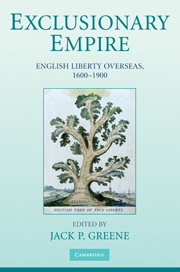Book contents
- Frontmatter
- Contents
- Notes on Contributors
- Preface
- Introduction
- 1 The Languages of Liberty in British North America, 1607–1776
- 2 Liberty and Slavery
- 3 “Era of Liberty”
- 4 Liberty and Modernity
- 5 Federalism, Democracy, and Liberty in the New American Nation
- 6 Liberty, Order, and Pluralism
- 7 Contested Despotism
- 8 “… a bastard offspring of tyranny under the guise of liberty”
- 9 How Much Did Institutions Matter?
- 10 The Expansion of British Liberties
- Index
3 - “Era of Liberty”
The Politics of Civil and Political Rights in Eighteenth-Century Ireland
Published online by Cambridge University Press: 05 June 2012
- Frontmatter
- Contents
- Notes on Contributors
- Preface
- Introduction
- 1 The Languages of Liberty in British North America, 1607–1776
- 2 Liberty and Slavery
- 3 “Era of Liberty”
- 4 Liberty and Modernity
- 5 Federalism, Democracy, and Liberty in the New American Nation
- 6 Liberty, Order, and Pluralism
- 7 Contested Despotism
- 8 “… a bastard offspring of tyranny under the guise of liberty”
- 9 How Much Did Institutions Matter?
- 10 The Expansion of British Liberties
- Index
Summary
INTRODUCTION
The liberties of the kingdom of Ireland and of the Protestant population that constituted its political nation were central to political discourse in Ireland in the eighteenth century. This is attributable primarily to the perception of much of that political nation that they were entitled for historical, ethnic, and religious reasons to possess the same rights and liberties as Englishmen. Indicatively, they legitimated their claim by reference to rights granted by the Crown to the first generation of English settlers in Ireland, and were prone during the late seventeenth and early eighteenth centuries to describe themselves as “of English blood born in Ireland.” They did, to be sure, embrace a more distinctively Irish identity in the course of the eighteenth century, but this development did not dilute the esteem in which they held the English constitution, or their conviction that as subjects of the same Protestant royal house and residents of the kingdom of Ireland they were entitled to enjoy the same liberties. The main problem they encountered in realizing this aspiration was that the British governing elite instinctively conceived of Ireland in colonial terms, and was disinclined as a consequence to acknowledge the Irish Parliament's legislative autonomy or to extend the same liberties to Irish Protestants that were possessed by Englishmen. This situation ensured that the aspiration of Irish Protestants to possess equal constitutional and civil liberties provided one of the main themes of both Anglo-Irish and domestic Irish politics in the eighteenth century.
- Type
- Chapter
- Information
- Exclusionary EmpireEnglish Liberty Overseas, 1600–1900, pp. 77 - 111Publisher: Cambridge University PressPrint publication year: 2009
- 1
- Cited by

